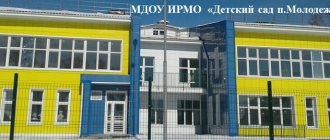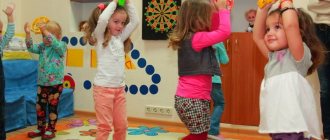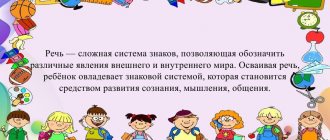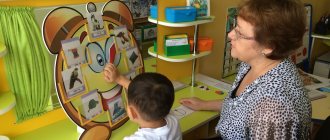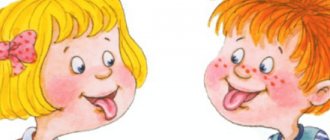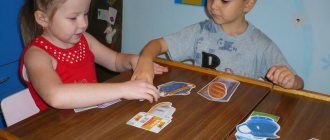Speech therapy consultations for parents in kindergarten
Speech therapy consultations prepared for parents are carried out regularly in kindergarten in order to teach adults to communicate with children. The vast majority of mothers and fathers do not know how to construct sentences and talk with a child so that he understands the meaning of what was said and strives to answer.
Lesson with a specialist
Speech therapy manuals for parents to study
Speech therapy manuals for preschoolers make up a whole library of useful and simple exercises, classes in which will help parents understand their mistakes in communicating with children and guide them on the right path for the development of their preschooler.
Album of exercises for children with speech disorders
Using an album for speech development helps parents navigate when planning independent exercises. On the pages of such manuals there are interesting pictures that can attract children's curiosity and turn activities into games. Under the pictures for parents there are descriptions of the exercise corresponding to each picture. For example, for the image of a balloon, you can find the following description: “Put your palms folded together smoothly in different directions, accompanied by a long sound “sh-sh-sh”.
Such albums offer exercises for training speech breathing, thanks to which it will be possible to deliver a clear, slow pronunciation that will not turn into stuttering due to the fast pace.
Exercises from the album
Interesting! Other author's albums are focused on the development of phonemic awareness. Classes in this manual teach you to distinguish oppositional sounds: both in someone else’s speech and in your own pronunciation. Much attention is paid to pairs of hard and soft sounds, as well as deaf and voiced.
Album of game exercises for speech development
Game albums contain speech therapy materials, work on which improves articulation and teaches adults to carry out simple exercises with children at home to train control of the speech apparatus. Illustrations showing lip position for each sound engage babies, encouraging them to repeat.
Learning to write poems and riddles
Introducing riddles opens up a new world for preschoolers. Obvious information presented in the form of a riddle is extremely exciting for kids. It is best to start familiarizing yourself with understandable material - with a description of animals, their habitats and the sounds they make. During such exercises, parents are recommended to use cards with illustrations of popular animals.
They are easy to find on the Internet and print out for training. The animal is first described to the child, for example, like this: “He is big, shaggy, lives in the forest, loves to eat raspberries and honey, and sleeps in a den for the winter.” If the child finds it difficult to answer, show a picture of a bear. After several games, adults invite the child to choose a card and describe the animal.
Familiarity with rhyme is extremely valuable for children with speech disorders, incorrect breathing patterns, and also with stuttering. Listening daily to quatrains with a simple rhythm, the text is involuntarily remembered and a sense of tact is developed. A two-year-old child is able to repeat the endings of the lines of works familiar to him. Older children can already learn to write their own rhymes together with their parents. This is especially successful during a long walk, when the rhythm of speech coincides with each step.
How to teach a child to say the hissing sounds “sh” and “zh” correctly
Important! Specialized speech therapy manuals contain a description of the technology for teaching poetry, offer examples of lines with the correct rhythm that is easily perceived by the child, and also contain many unfinished quatrains that the child can finish himself.
Poem as medicine
Where to treat pathology?
Institutions providing speech therapy assistance for this disorder can be divided into several classes: specialized centers, hospitals and clinics. In addition, there are a large number of private practitioners who also provide their services to children with speech impairments.
Specialized centers
In large cities of Russia, for example, in Moscow and St. Petersburg, there are specialized centers for the treatment of speech disorders, including pathologies of speech development. Such institutions make it possible to provide comprehensive therapy, including consultations with a speech therapist, psychologist, neurologist, speech pathologist and other specialists.
In Moscow there is Dr. Arkhipov’s Center for the Treatment of General Speech Underdevelopment, a center for speech pathology and neurorehabilitation, as well as several other specialized institutions. In St. Petersburg, similar problems are dealt with by: St. Petersburg Research Institute of Ear, Throat, Nose and Speech, Center for Behavioral Neurology, PROGRESS Medical Center, etc. These clinics specialize in eliminating speech defects, making treatment there highly effective.
General medical facilities
Most children's clinics and hospitals have correctional departments aimed at eliminating speech defects. As a rule, the treatment of pathologies is carried out by a speech therapist together with a psychologist and a neurologist. The main method of therapy in this case is a set of exercises that allow you to normalize all parts of speech function: vocabulary, grammar and phonetics.
In cases of grade 2 and 3 OHP, correction is mainly carried out on an outpatient basis with dynamic observation by a speech therapist. The specialist gives parents the necessary activities for their children and monitors their effectiveness once every 2-4 weeks. If necessary, correction activities include regular exercises in special groups of children.
You can go to a hospital for the correction of general speech underdevelopment in any city with a referral from a speech therapist, or on your own. These institutions have the necessary specialists to determine the causes of the development of OHP and comprehensive correction.
At what age does a speech therapist begin seeing children?
Before making an appointment, you need to find out at what age speech therapists begin working with a child. The problem of lack of buzzing may bother the mother of a baby who is not yet six months old. But a speech therapist will not work with a six-month-old baby. Exercises on sound and breathing can already be used in working with children from 2 years old. The first visit to a speech therapist may not take place before this age.
The child does not want to work with a speech therapist
Visiting a specialist often causes anxiety in children. And it happens that a child is signed up for classes, but he disrupts them, or refuses to go completely. But in most cases, consultation with a speech therapist for preschool parents is a paid service. Situations where a month of work is paid, but the service is not received due to the child’s fault, are not uncommon. If a specialized specialist cannot find an approach to the baby on his own, he will have to help him with this or change him to a more qualified one.
A child’s refusal to do this kind of work is a natural phenomenon and one cannot scold him for it, otherwise a trip to any other specialist will always be associated with swearing and negative emotions. For successful and fruitful work with a speech therapist, you need to describe everything that a rebel loves. It is useful for the teacher to know this information in order to competently build communication. You need to list everything - from your favorite heroes to the latest skills that your child is happy to show off.
Additional Information! It should be remembered that a speech therapist has many regular and occasional patients, so it is wiser to draw up a card of children’s preferences and paste it into the child’s personal file so that the specialist can have a clue before his eyes.
Child tries hard in class
How many sessions with a speech therapist does a child need?
The recommended frequency of lessons is twice a week. But the length of time and how many sessions a child needs with a speech therapist depends on the severity of the defect and the degree of effect achieved. Some manage to get rid of the problem in 3-4 sessions, while others take a year to correct the problem.
The best speech therapy manuals for preschoolers
Speech therapy manuals exist for both parents and practitioners.
General speech therapy material
For the timely development of children without deviations in pronunciation and perception of sounds, there are useful teaching aids that guide the right path of development of a healthy child. Books such as:
- “Speech therapy primer”, N. Tegipko;
- “Speech therapy, basics of theory and practice”, N. S. Zhukova, E. M. Mastyukova, T. B. Filicheva;
- "Articulatory ABC" publishing house Karapuz.
Speech development in the middle group of kindergarten - norms and features
Methodological manual for beginning speech therapists
Any modern bookstore offers a wide range of literature for practicing specialists.
Interesting! The higher the qualifications of a speech therapist, the more teaching aids he strives to study, in contrast to beginning specialists who believe that the education received at a university is sufficient.
The methodological manual “Lessons of a Speech Therapist” by N. S. Zhukova is focused on organizing classes with children with disabilities. The author has been studying the stages of development of preschool speech for more than a decade, and based on the results obtained, he creates manuals that every practitioner should have on his or her desktop.
Speech therapist lessons, book
Book for kindergarten teachers
Educators whose group includes children with speech impairments should practice the daily planning scenarios described in popular manuals:
- T. Suvorova “Dance rhythm for children”;
- L. A. Wenger, E. G. Pilyugina “Education of a child’s sensory culture.”
The relationship between the work of a teacher and a speech therapist
An important condition for high-quality speech development is continuous contact between the teacher and the speech therapist. In the group, it is desirable to have a corner for speech development, in which there will be devices that develop fine motor skills of the hands and toys for the development of speech breathing.
Interesting! Consultations with a speech therapist for parents in the senior or preparatory group of a kindergarten should be supported by the supervision of a teacher, who, in his work, notes the presence or absence of progress in the child while he is on the territory of the institution.
Interaction between speech therapist and parents
A friendly atmosphere should reign in any logo center. Situations where parents make complaints to the speech therapist in front of their child, or parents are given a poor assessment of their independent work in the presence of the patient, are unacceptable. If this happens at least once, you can stop the classes immediately, because they will not give results. Only friendly communication and tactful discussion of difficult moments will create a healthy atmosphere for the treatment of a non-speaking or incorrectly speaking child.
How to correct a child’s speech without a speech therapist
To work independently at home, it is wise to find an educational website, register on it, after which a lot of useful literature will become available, the use of which will help in solving many issues. It is wise to fill home lessons with homemade devices, for example, create your own book from felt, and play with it with your child, developing motor skills and horizons.
Felt book
Speech therapy sanatoriums for children with parents
When a child has a severe form of illness that prevents the full development of speech, or in situations where parents want to be closely involved with their children, the question of useful rest arises. In our country there are enough speech therapy sanatoriums for children with their parents, where children are not separated from their families and receive qualified help from professionals in a comfortable, healthy environment.
It is important to remember that a child’s healthy and beautiful speech can successfully develop on its own if the baby lives in a healthy environment at home. You always need to start with yourself, evaluate the manner of pronunciation, intonation and speed of speech when searching for the cause of disorders in a preschooler.
General underdevelopment of speech can be observed in the most complex forms of childhood speech pathology: alalia, aphasia, as well as rhinolalia, dysarthria - in cases where insufficient vocabulary of the grammatical structure and gaps in phonetic-phonemic development are simultaneously detected.
CHARACTERISTICS OF CHILDREN WITH GENERAL SPEECH IMPORTANCE
Despite the different nature of the defects, these children have typical manifestations indicating a systemic disorder of speech activity. One of the leading signs is the later onset of speech: the first words appear by 3-4, and sometimes by 5 years. Speech is ungrammatical and insufficiently phonetically designed. The most expressive indicator is the lag in expressive speech with a relatively good, at first glance, understanding of addressed speech. The speech of these children is difficult to understand. There is insufficient speech activity, which drops sharply with age, without special training. However, children are quite critical of their defect.
Inferior speech activity leaves an imprint on the formation of children's sensory, intellectual and affective-volitional spheres. There is insufficient stability of attention and limited possibilities for its distribution. While semantic and logical memory is relatively intact, children have reduced verbal memory and memorization productivity suffers. They forget complex instructions, elements and sequences of tasks.
In the weakest children, low recall activity can be combined with limited opportunities for the development of cognitive activity.
The connection between speech disorders and other aspects of mental development determines specific features of thinking. Possessing, in general, complete prerequisites for mastering mental operations accessible to their age, children lag behind in the development of verbal and logical thinking, without special training they have difficulty mastering analysis and synthesis, comparison and generalization.
Along with general somatic weakness, they are also characterized by some lag in the development of the motor sphere, which is characterized by poor coordination of movements, uncertainty in performing measured movements, and a decrease in speed and dexterity. The greatest difficulties are identified when performing movements according to verbal instructions.
